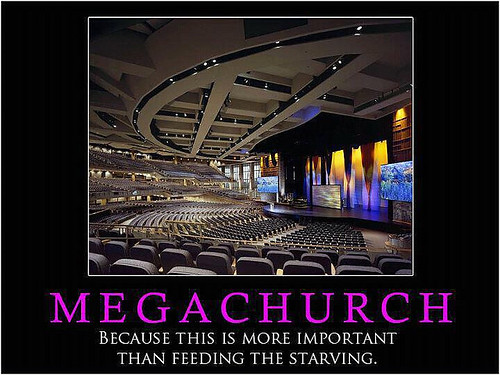In part one, which you can read here if you like (and I’d be grateful if you did), I discussed what I see as a sad and unfortunate occurrence in the modern evangelical Protestant church: the emphasis on the church building, even when put in terms of how it serves the church body, more than on the church working in the wider world to help those in need. I haven’t collected statistics, so I can’t call it a trend, but I’ve noticed it over just the last couple of years in a handful of churches in central North Carolina so I think it’s safe to deduce that it may be happening elsewhere as well.
I wrote in part one that
Of course, you don’t need my approval to step out in faith (or to take out that mortgage) and build whatever kind of building you want. And you can believe “where God guides, he provides” and believe that God is guiding you in that endeavor. After all, Isaiah 58:11 says, “the Lord will continually guide you, and satisfy your soul in scorched places,” does it not?
Now, let’s take a closer look at that “where God guides, he provides” idea.
Scripture offers us many examples of God providing for his people, from the ram in the thicket that Abraham could sacrifice in place of Isaac (for which Abraham named the place “The Lord will provide,” or in Hebrew, “YHWH-jireh”) to the triple provisions of water, manna, and meat as the newly-freed Jews traversed the desert. And we can find numerous references to God’s guidance, in the form of miraculous clouds and fire, angelic visitations, dreams, and so forth; in accounts of people heeding that guidance or struggling against it; in exhortations to guide others wisely and warnings against false guides; in expressions of hope, such as “You are my rock and my fortress; For Your name’s sake You will lead me and guide me” (Psalm 31:3); etc.
However, I haven’t found that pithy saying “where God guides, he provides” in Scripture. The closest match I’ve been able to find is that verse from Isaiah 58 quoted above, which mentions continuous guidance and follows that with the assurance that God will satisfy the soul (sometimes rendered “desire”). Looser translations go so far as to express that soul-satisfaction or that fulfilment of desire in the form of being given good food to eat, even when we are in deserted places.
But I learned long ago that we can lead ourselves into error when we look at individual Scripture verses out of context.
So what else does Isaiah 58 say? Let’s start in at verse six:
Is this not the fast which I choose: to loosen the bonds of wickedness, to undo the bands of the yoke, to let the oppressed go free and break every yoke? Is it not to divide your bread for the hungry and bring the homeless poor into the house; when you see the naked, to cover him; and not to hide yourself from your own flesh?
Then your light will break out like the dawn, and your recovery will speedily spring forth; and your righteousness will go before you. The glory of the Lord will be your rear guard.
Then you will call, and the Lord will answer; you will cry, and He will say, “Here I am.”
If you remove the yoke from your midst, the sending out and speaking wickedness, and if you furnish yourself to the hungry and satisfy the soul of the afflicted, then your light will rise in darkness and your gloom will become like midday.
And the Lord will continually guide you, and satisfy your soul in scorched places, and give strength to your bones. And you will be like a watered garden, like a spring of water whose waters do not deceive.
Those from among you will rebuild the ancient ruins; you will raise up the age-old foundations; and you will be called the repairer of the breach, the restorer of the paths in which to dwell.
I suggest two takeaways here.
First, if the Lord continually guides us and satisfies our needs in hot, deserted places, then it must be that the Lord guided us into those hot, deserted places from the outset. Not into some cool, air-conditioned auditoriums where we can satisfy ourselves, where we can bask in the incandescent, fluorescent, and halogen glow of God’s love and enjoy the music of those angelic electric guitars, but into difficult places, dangerous places, where we might fear to tread were it not the Lord guiding us.
Second, the guidance and provision come after we have done what the Lord would have us do: after we have loosed the bonds of wickedness and oppression, shared our bread with the hungry and the poor, and so forth. Then our light will shine like the dawn — or as Jesus said, so that others may glorify our Father in heaven: not so that we may be glorified as individuals or as a church. Then the Lord will answer our calls and our cries and our prayers. The Lord will provide for us while we do those things because those are the things He would guide us to do.

(Image: “Work Ethic,” by brett jordan, on Flickr under Creative Commons.)
Which means to me that if we are not doing those things — if we are taking care of ourselves by building fancy facilities at the expense of doing the good works which are the purpose for which we are saved (Ephesians 2:10), and without which we are dead in our faith (James 2:26) — then our light will be dim and gloomy to the world that is watching us. We may convince ourselves that our churches are alive inside, but from the outside their fancy trappings look like whitewashed tombs.
I’ve been told, for more years than I can recall, that the church isn’t the building, it’s the people. I wonder if those pastors and congregations who put a lot of emphasis on (and pour most of their money into) big, impressive buildings still believe that. I think deep down they must, but I fear they’ve been seduced by spiritual scoreboards that tally baptisms and weekly attendance as if those are the measures by which Christ values their ministries.
I’ve been told also that the road to Hell is paved with good intentions. And I’m beginning to think it may be lined on both sides with massive, expensive church buildings that sit empty and unused 90% of the time — and may be empty of compassion and pure religion even when occupied.



 by
by 

















